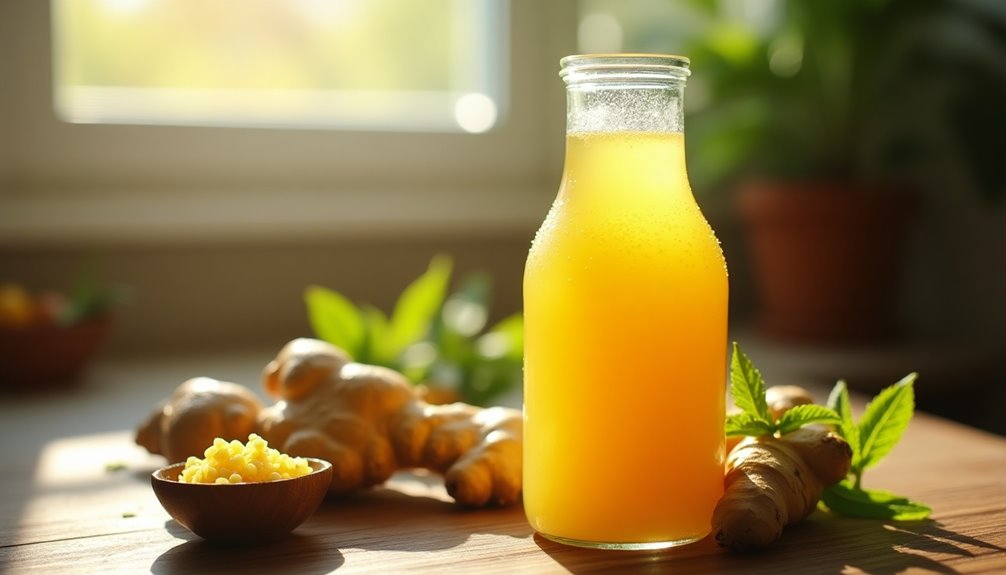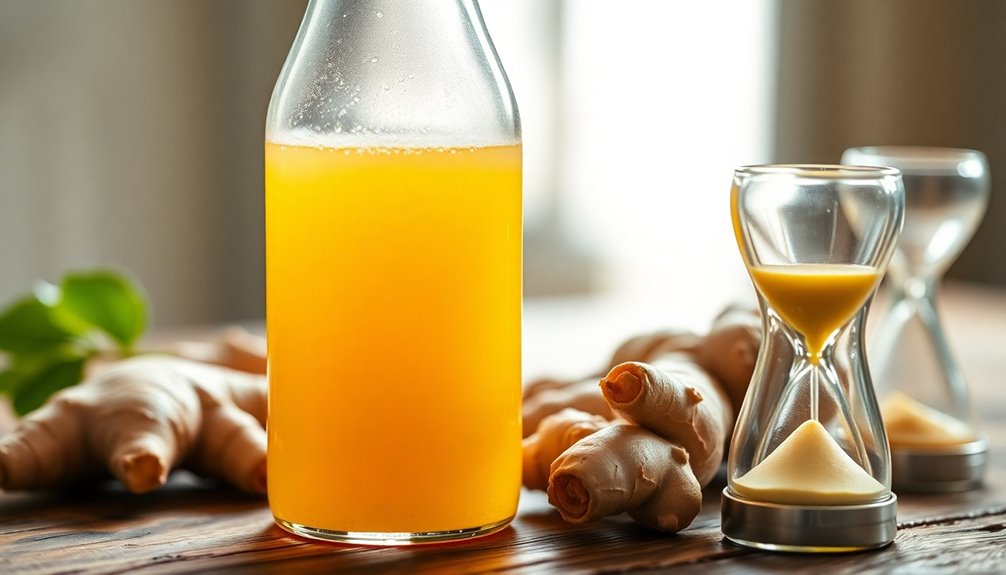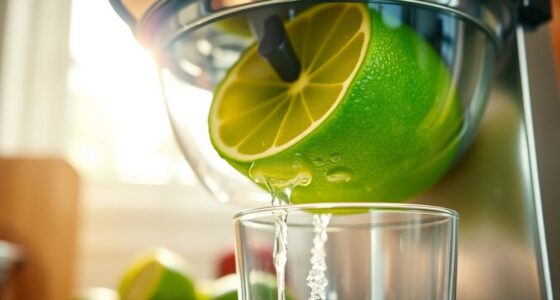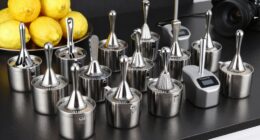Ginger juice has a short shelf life, so it's best to consume fresh ginger juice within 24 to 48 hours for optimal flavor and health benefits. Opened store-bought juice lasts about 7 to 10 days, while pasteurized versions can last up to two to three months in the fridge. If you want to extend its life further, freezing ginger juice in ice cube trays can preserve it for up to six months. There's more to explore about how to store it effectively!
Key Takeaways
- Fresh ginger juice is best consumed within 24 to 48 hours for optimal flavor and potency.
- Opened store-bought ginger juice lasts about 7 to 10 days in the fridge due to preservatives.
- Pasteurized ginger juice can be stored for 2 to 3 months in the fridge after opening.
- Frozen ginger juice cubes can maintain quality for up to six months when properly stored.
- Homemade ginger juice should ideally be consumed immediately, but can be frozen for later use.

Have you ever wondered how long ginger juice really lasts? If you've got a bottle of fresh ginger juice or made some homemade ginger juice yourself, it's important to know how to store it properly to maximize its shelf life and health benefits.
Fresh ginger juice, especially when unpasteurized, is best enjoyed shortly after making it. Ideally, you should refrigerate and consume it within 24 to 48 hours. This short lifespan is due to its natural enzymes and compounds that begin to degrade quickly, impacting both flavor and potency.
When you store fresh ginger juice, it's crucial to use an airtight container. By keeping it stored in an airtight environment, you minimize exposure to air and other contaminants, which can accelerate spoilage.
If you've bought ginger juice from the store, you might notice different storage guidelines. Opened store-bought ginger juice can last about 7 to 10 days in the fridge, thanks to preservatives that help maintain its quality. However, once you open that bottle, the clock starts ticking, so make sure to keep it sealed tightly.
If you've opted for pasteurized ginger juice, you're in luck! After opening, it can last up to two to three months in the fridge. Pasteurization extends the shelf life significantly, allowing you to enjoy its benefits over a longer period. Simply keep it stored in an airtight container, and you'll be able to enjoy that zesty flavor whenever you like.
For those who like to plan ahead, freezing ginger juice is a fantastic option. You can pour it into ice cube trays, freeze it, and then transfer the cubes to a freezer-safe bag. This method allows you to keep ginger juice for up to six months while preserving its quality. Whenever you want to use some, just pop out a cube and let it thaw. It's a convenient way to ensure you always have fresh ginger juice on hand without worrying about it going bad.
Homemade ginger juice, while delicious and packed with health benefits, should ideally be consumed immediately. The fresher it is, the more potent the nutrients and flavors will be.
If you do make a batch, think about using the ice cube tray method for any leftovers. That way, you won't have to sacrifice freshness or health benefits.
Frequently Asked Questions
How Long Does Ginger Juice Last in the Fridge?
When you store ginger juice in the fridge, its longevity depends on how you've prepared it.
If it's fresh and homemade, you should use it within 24 to 48 hours for the best flavor and potency.
For opened store-bought ginger juice, it'll keep well for about 7 to 10 days.
To maximize freshness, always use airtight glass containers and consider freezing leftover juice in ice cube trays for longer storage.
Can Liquid Ginger Go Bad?
Think of liquid ginger as a vibrant spark that can dim over time.
Yes, liquid ginger can go bad. You'll notice signs like off odors, changes in color, or even mold forming.
Freshly made ginger juice only lasts a couple of days in the fridge, while store-bought can last longer if unopened.
Always check for spoilage before using it. When in doubt, it's better to discard it than to risk your health.
How Do You Know When Ginger Is Not Good Anymore?
To know when ginger's not good anymore, check for changes in color; darkening or browning means it's likely spoiled.
Trust your nose—if it smells off or foul, toss it out.
Look for any signs of mold or fungus; if you see that, it's definitely time to discard it.
Lastly, if the taste is altered or sour, even if it looks fine, don't take the risk—just throw it away.
How Long Do Juiced Ginger and Lemon Last?
Imagine biting into a fresh ginger cookie, bursting with flavor.
That's what you want from your ginger and lemon juice, too! When you juice them, they've got a short lifespan. You can store your freshly juiced mixture in the fridge for about 24 to 48 hours in an airtight container.
If you want to keep it longer, consider freezing it; this way, it'll stay fresh for up to six months!
Conclusion
In conclusion, think of ginger juice as a vibrant summer day; it shines brightest when fresh, typically lasting about 1-2 days in the fridge. Just like the sun setting, its potency fades over time, losing flavor and nutrients. If you want to keep that zing alive, consider freezing it in ice cube trays for later use. So, savor that spicy essence while you can, and don’t let it slip away like sand through your fingers. Additionally, while you’re enjoying the lively taste of ginger juice, it’s worth exploring other invigorating options like cranberry juice. Recent studies have shed light on how cranberry juice affects sexual health, suggesting that its properties may aid in maintaining urinary tract health, which can be beneficial for intimate wellness. Embrace the variety of flavors and health benefits that nature offers, allowing yourself to discover new sensations that complement your well-being.
Cindy thoroughly researches juicing trends, techniques, and recipes to provide readers with practical advice and inspiration. Her writing style is accessible, engaging, and designed to make complex concepts easy to understand. Cindy’s dedication to promoting the advantages of juicing shines through her work, empowering readers to make positive changes in their lives through the simple act of juicing.











